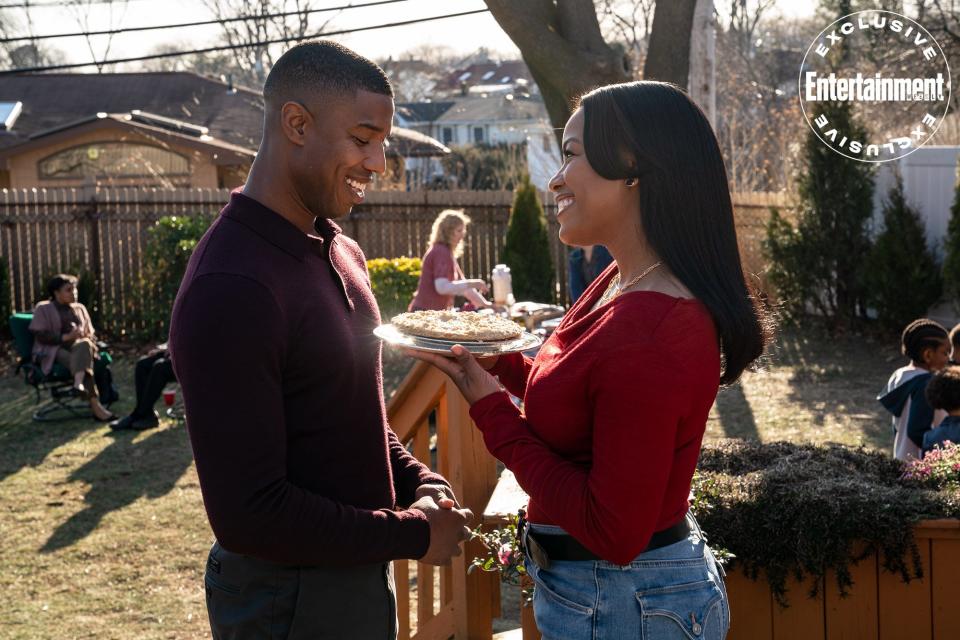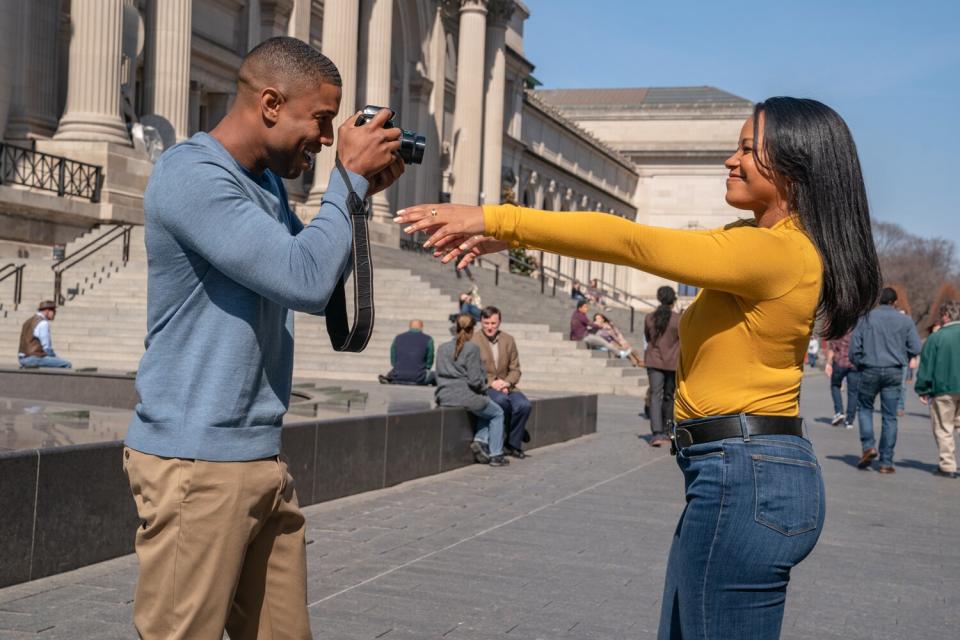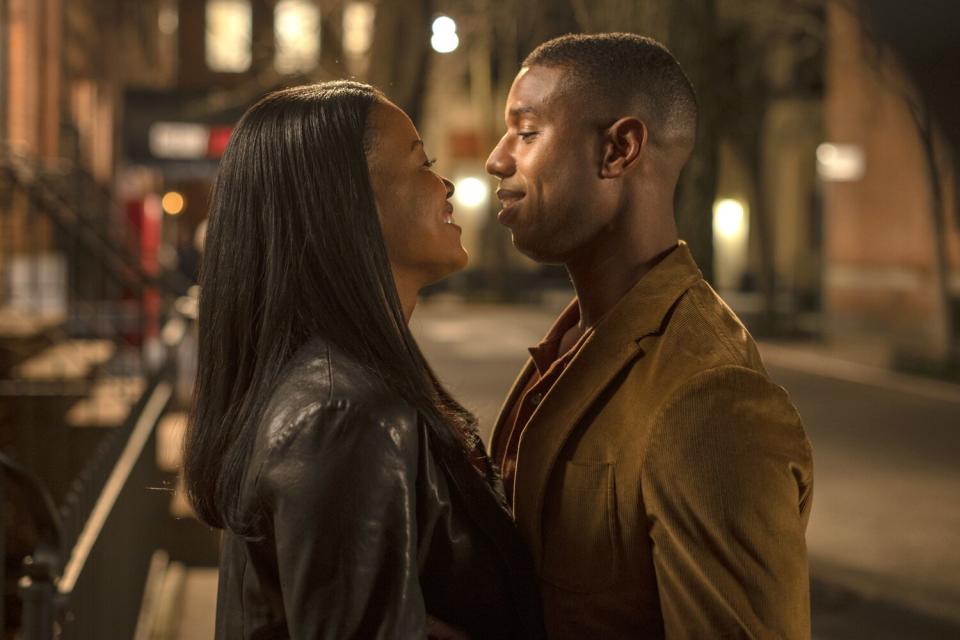Michael B. Jordan calls working with Denzel Washington on A Journal for Jordan a 'master class'

- Oops!Something went wrong.Please try again later.
- Oops!Something went wrong.Please try again later.
- Oops!Something went wrong.Please try again later.
Sony's upcoming film A Journal for Jordan seems like a surefire entry into the canon of holiday season tearjerkers, with Michael B. Jordan playing real-life First Sergeant Charles Monroe King, who kept a journal full of wisdom to relay to his newborn son should he not make it home from war.
For Jordan, art imitated life in a way, given how the project, an adaptation of the memoir King's wife, Dana Canedy, wrote in 2008, that incorporated in the military man's written legacy, also gave him a chance to be directed by one of his idols, Denzel Washington. "To be able to hear those gems, and stories, and things to avoid, and what to look for, just things of that nature, personally helped me out a lot," says the actor of working with the two-time Oscar winner.
Read on to hear more of what Jordan learned from Washington, how he and co-star Chanté Adams worked to do justice to this true story, and how working on the film prepared him to direct and star in Creed III.

David Lee/Columbia Pictures
ENTERTAINMENT WEEKLY: What can we expect from A Journal for Jordan? I know it's coming around Christmas time.
MICHAEL B. JORDAN: You can expect a real grounded, love story that will make you smile, laugh, cry, and somehow wish the ending would change. It's one of those movies that checks a lot of the boxes. And it's a true story, so we just wanted to do Dana and Charles justice, and Jordan of course. And be honest, truthful, and vulnerable with their story. Hopefully we did that with this one.
What drew you to this movie?
Honestly, the opportunity to work with Denzel. When [San Antonio Spurs coach Gregg] Popovich, or somebody gives you a call, it's like, "Oh, s---. OK. Yeah, yep. I'm showing up." Whatever it is, we gotta figure it out. But I think the opportunity to work with one of my mentors and somebody that I idolized, to be able to learn from him and be directed by him, was priceless. And then when I read the book and I found out more about the story, I felt like it was the perfect opportunity because I'd never done a movie like this before either. So to be able to step into a new space with a great IP, with a great core foundation of the story and these people's lives — and then you mix that with Denzel, and somebody as talented as Chanté, and [producer] Todd Black, and everybody else that was involved in making this project, it just seemed like a no-brainer.
I was wondering too, did Denzel say what drew him to this project? Because I was pleasantly surprised he directed this film too.
I think it's a personal project. Denzel has an affinity for armed services and the military, an appreciation, and wants to also tell true stories of what that sacrifice is about. So I think for him, not to speak for him, but I also feel like it was something that he might have been looking at for himself maybe earlier on. You know how some things get stuck in development, and not the right time, and scheduling, and for a lot of different reasons. It just happened to be the right timing for us to work on it in this type of way.
You already mentioned you read the book. Was that the main blueprint for this character? What else did you do to prepare to play Charles?
I went to go train. Went down to Fort Irwin. Went through a little bit of bootcamp. Went through that experience of what Charles would actually be doing, leading the platoon, being able to talk with his wife, and spend time with her. And talk to her about what that was like, falling in love. "What was it like when you first met him? What was it first like becoming a mother?" Getting a chance to talk to Jordan as well.
So I think being able to have people that were so close to him as a resource was so extremely important. But then, physically going through the transformation, living that life as long as I could. Especially with the pandemic, and quarantine, and all that other things that made things a little bit more complicated to maneuver. All those things added up to the prep to step into this role.

David Lee Michael B. Jordan and Chanté Adams in 'A Journal for Jordan.'
Were there any resonant quotes from the journal that stuck with you and helped shape the Charles that you wanted to play?
[The ones] about how to treat a woman. There's a lot of questions in there that I think as a dad, if you're writing it with the state of mind of I may not be able to have these in-person conversations with my son, so let me write down all the things I would want to tell him. There were so many things in there that stuck out and resonated, but overall we use a lot of the journal entries in the script, so you'll actually get quotes and actual thoughts from Charles in the movie as well. So we just tried to stay in that wheelhouse of truth and just be as honest as we could throughout every step.
I know particularly from watching the trailer, that line where it's like, "Look at your mother, so you know what I think is beautiful..." That's one part smooth, one part touching.
Exactly, yeah. Knowing his wife was going to read it too, right? You know what I'm saying? But it was all those little things in there were good.
I got a kick out of the trailer saying "introducing Chanté Adams," who audiences may have already seen in films like Roxanne, Roxanne and The Photograph. What was it like working with her and building that chemistry that conveys all the emotions that swarm this couple in those all too brief moments they get to be together?
She was fantastic. Chanté brought Dana to life in a way where I caught myself watching sometimes in awe. She's really, really good. And it was fun to play the stages when you first meet somebody, what that feels like falling in love. Yeah, we got a chance to be upset with each other, be in love with each other, be goofy, be shy; to hit all those milestones that you do in any relationship. And I think she just did an amazing job at just being present. That's so key and important, and yeah, she's just wildly talented, so it was a great time.

David Lee Chanté Adams and Michael B. Jordan tell a true story in 'A Journal for Jordan.'
Getting back to Denzel Washington, what was it like being directed by him? Did this project feel like it prepared you for Creed III?
Answering the third one last, it definitely prepared me for Creed III. I think just asking him a s---ton of questions, and observing how he runs a set, how he communicates with department heads, and just the process of what to look for and what to expect on a day-to-day grind. So it was definitely the right project for me to do right before [Creed III], for sure. Being directed by Denzel, it's like you had a master class at everything. He shows up every day to work to give it his all. He leaves with nothing in the tank, so you've got to match that energy and that drive. So it definitely pushed me to do more. That was an incredible experience. Character development, breaking down characters, just getting to the micro of everything, being as specific as possible. It raised my game in a lot of ways, so I'm extremely grateful for that process.
Finally, what is your attraction to father/son legacy stories? Because I see that as a throughline between Creed, Raising Dion, and this.
I think that there's an importance of representation in fatherhood and leadership. It's been a stereotype that's been floating around for a long time. And there's a lot of great examples of father/son relationships that are present, that are there, that are doing the right thing, that are uplifting, and informative, and inspiring. And being a part of telling those stories, I think is a gift and something that I enjoy doing.
And you'll start to see with some of the projects and things that I'm doing in the future, that that doesn't just stop right there with fathers and sons. There's fathers and daughters that are there as well, that I think could be highlighted as well. And I know how important my father was in my life, how impactful that presence was there, that him being there was for me. So you try to take a piece of yourself and things that you think are good examples of human nature, human behavior, family dynamics, that can help people aspire to be better, be more present. Things of that nature.
A Journal For Jordan comes out in limited release Dec. 10 ahead of a wide release Dec. 22.
This interview has been edited and condensed.
To read more from our Fall Movie Preview, order the November issue of Entertainment Weekly or find it on newsstands beginning Friday. Don't forget to subscribe for more exclusive interviews and photos, only in EW.
Related content:

